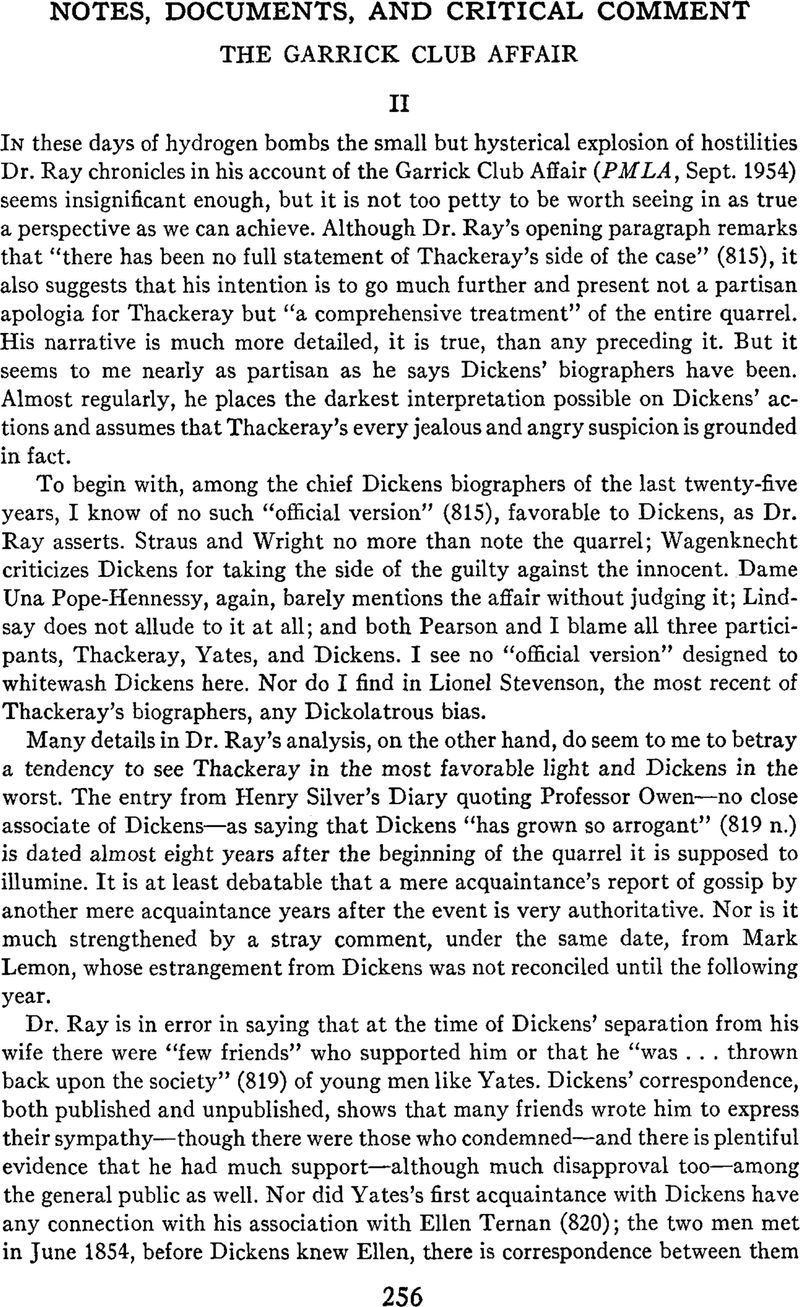No CrossRef data available.
Article contents
The Garrick Club Affair
Published online by Cambridge University Press: 02 December 2020
Abstract

- Type
- Notes, Documents, and Critical Comment
- Information
- Copyright
- Copyright © Modern Language Association of America, 1956
References
1 See, e.g., Dickens' note to W. H. Wills of 30 Oct. 1861 (Letters, ed. Walter Dexter, London, 1938, iii, 246).
2 The same, ii, 241.
3 Notes of a Son and a Brother (London, 1914), p. 237.
4 Dickens' letters begin “My dear Yates’ through 28 April 1858; after 31 May they begin “My dear Edmund” (Letters, ed. Dexter, iii, 19, 25).
5 I am not acquainted with any contemporary evidence that this letter was actually written, though Yates made a good deal of it during his disingenuous campaign of self-defense in the 1880's.
6 See George Saintsbury's valuable elucidation of this point, A Consideration of Thackeray (London, 1931), p. 127.
7 Mr. Johnson tries to show that Thackeray's standing as a gentleman was impaired by these indiscretions. Contemporary testimony to the contrary is of course overwhelming, but even the two pieces of evidence that Mr. Jonhson offers to support his contention do not bear scrutiny. In 1850 Thackeray was denied admission to the Athenaeum Club by a single vote when he was proposed “as one of the nine [new members] of distinguished eminence elected annually under Rule n. by the committee, who … must be unanimous in their choice” (Francis Gledstanes Waugh, The Athenaeum Club and Its Associations, London, n.d., p. 57). Macaulay wrote of the Thackeray ballot in his journal on 29 Jan. 1850: “The great majority [were] zealous for him. That wretched creature Hawkins threw him out. I never saw a man so little to my taste.… Croker was in the chair” (MS. journal, Trinity Coll., Cambridge). Since Wenham in Vanity Fair was modelled in part on John Wilson Croker, who here figures as one of Thackeray's principal supporters, Mr. Johnson's assumption that Thackeray was “blackballed … out of fear that he might lampoon [the Athenaeum's] members” is evidently mistaken. In any event Thackeray was elected to the Club a year later (Letters and Private Papers of William Makepeace Thackeray, ed. Ray, Cambridge, 1945–46, ii, 636–637, 754). Mr. Johnson's statement that Thackeray was refused admission to the Travellers' Club for the same reason rests on the assertion of Lewis Melville, who was apparently relying on the reminiscences of George Augustus Sala in his garrulous and forgetful old age (Things I Have Seen and People I Have Known, London, 1891, i, 34). There is nothing in Thackeray's papers or in the records of the Travellers' Club (so its Secretary has assured me) to show that his name was proposed for membership.
8 See, e.g., The Oxford Thackeray, ed. George Saintsbury (London, 1908), vi, 412–416; viii, 290; x, 626–628; George Hodder, Memories of My Time (London, 1870), p. 277.
9 Here is the summary of Charles Riddell Williams, whose “The Personal Relations of Dickens and Thackeray” is the only extended survey of this subject which has been published: “There is no doubt about it. Thackeray knew, enjoyed and greatly admired Dickens's work.… On the other hand, there is really no evidence that Dickens read any of Thackeray's books at all.… I think we must take it Dickens was really rather insensible to Thackeray's genius, whereas Thackeray recognized and delighted in Dickens's” (Dickensian, xxv [1938–39], 83).
10 A Philadelphia host told Thackeray in 1856 that, though he had reservations about Dickens as a novelist, “I like Dickens personally; he is so genial and frank.” Thackeray's reply was: “Genial, yes, but frank— … well, frank as an oyster” (“A. Z.,” “Some Recollections of Thackeray,” Lippincotfs Mag., vii [Jan. 1871], 107).
11 MS. letter to the Rev. Whitwell Elwin, 24–31 May 1861 (Houghton Library, Harvard Univ.); printed in part, Letters, iv, 237–239.
12 A leading motive with Thackeray was his desire to please Dickens' daughter Kate, of whom he had become fond. See Kate Perugini, “Thackeray and My Father,” Pall Mall Mag., xlviii (July 1911), 213–219.
13 It does not figure in Sir Theodore Martin's other version of the episode quoted by William Harris Arnold, Ventures in Book Collecting (London, 1923), pp. 85–86.
14 “Seeing Dickens Plain,” Virginia Quart. Rev., xxix (Spring 1953), 297–302.




